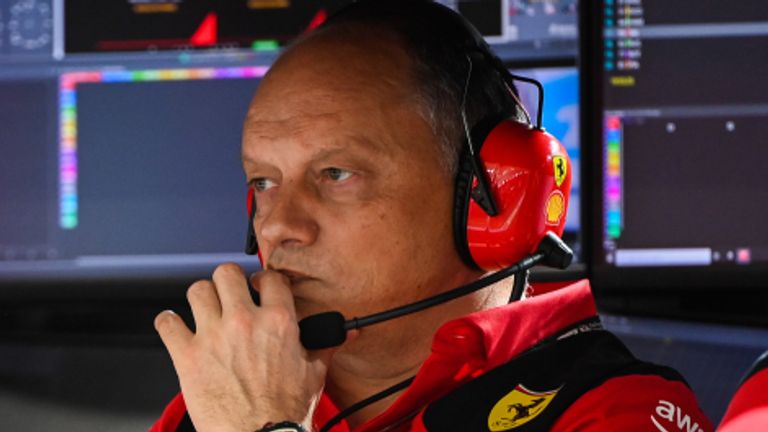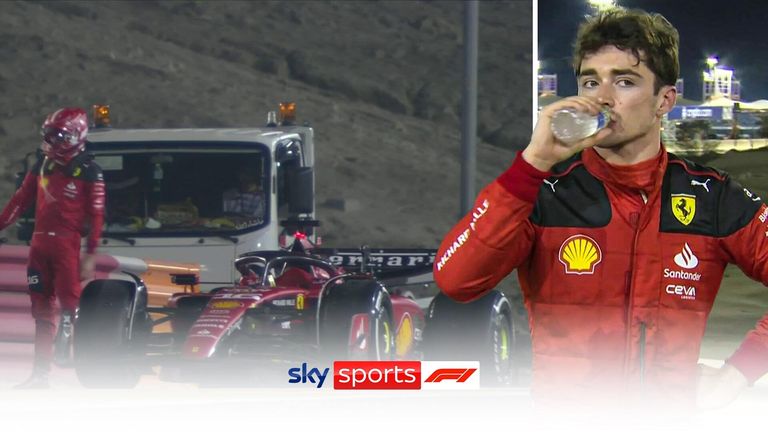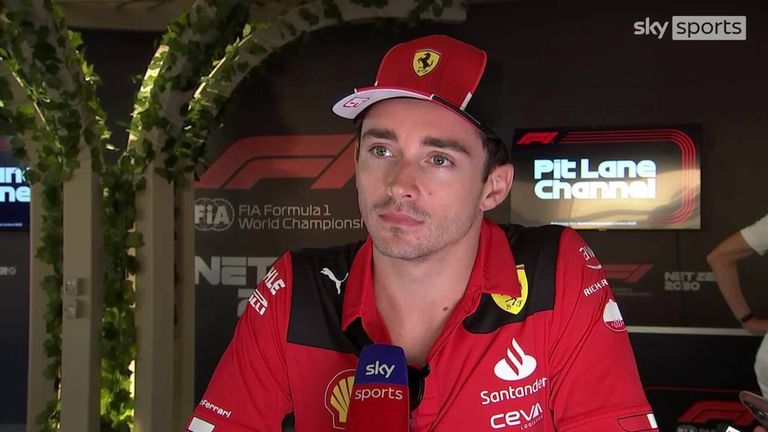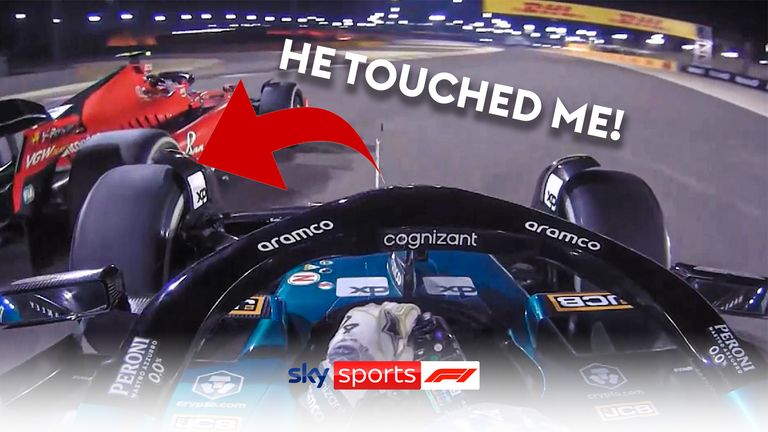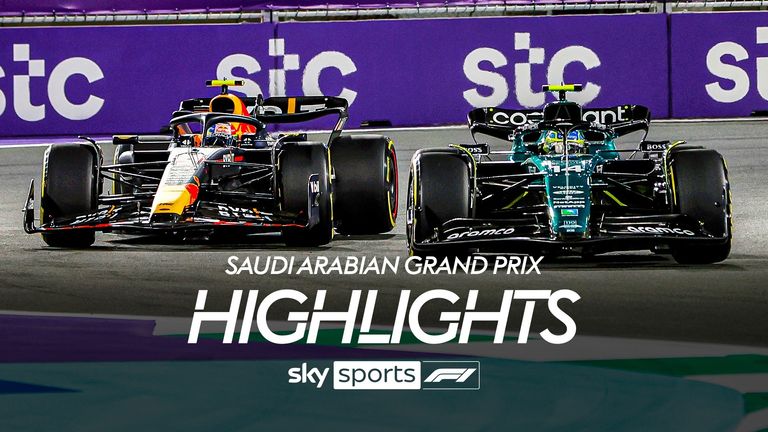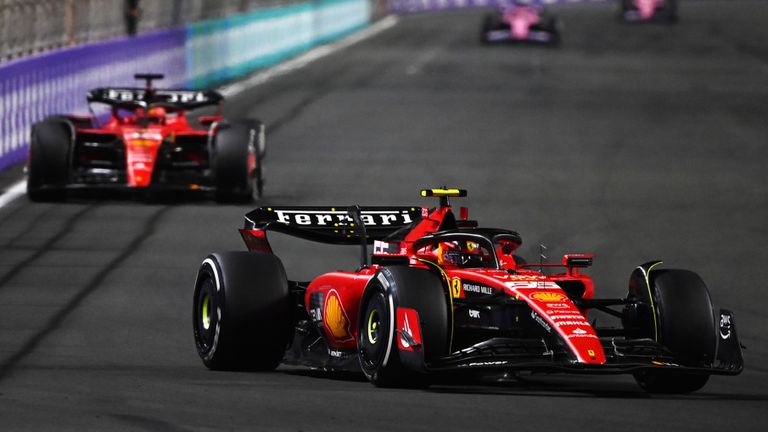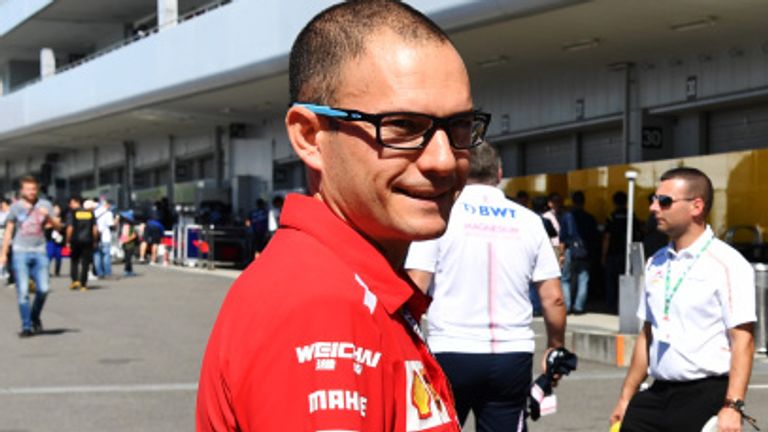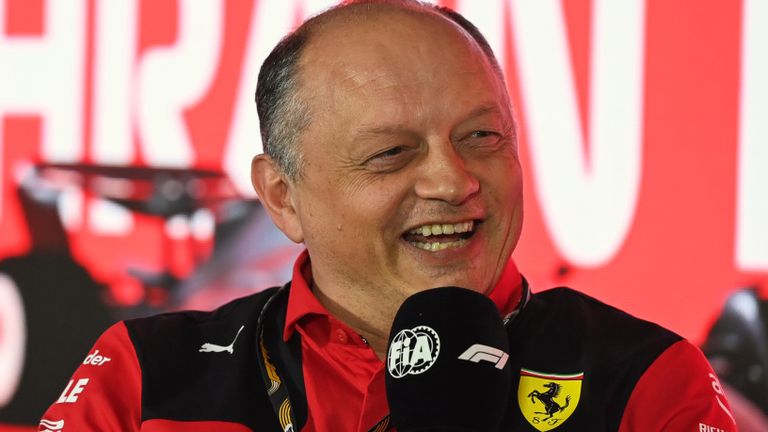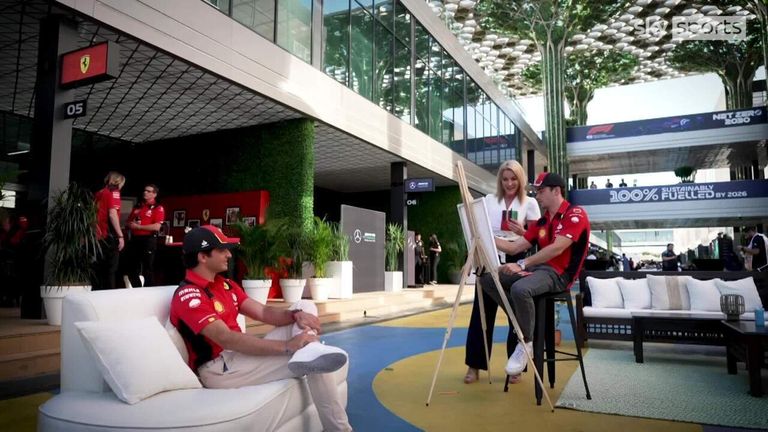Ferrari's tough start to the 2023 Formula 1 season analysed - what has gone wrong?
Ferrari have made a slow start to the 2023 Formula 1 season; Sky Sports F1 assesses how the sport's most famous team appear to have fallen back after being Red Bull's biggest challengers last year; watch Australian GP live on Sky Sports F1 between March 31 and April 2
Friday 24 March 2023 09:47, UK
After an off-season of upheaval that was meant to propel Ferrari back to glory, the opening weeks of the 2023 Formula 1 season have cast doubt over whether the Italian team are moving in the right direction.
The sport's most famous team removed Mattia Binotto from his role as team principal at the end of a 2022 campaign that had promised much but ended in disappointment, before hiring Frederic Vasseur from Alfa Romeo to fill the position.
While Binotto's reign had led to the production of a very fast car that was a match - at least in terms of pure pace - for Red Bull for the first half of last season, a combination of poor reliability and strategic errors would see Charles Leclerc lose touch with Max Verstappen, who ultimately eased to his second successive title.
- McLaren announce departure of technical executive James Key
- Christian Horner: Red Bull 'can't accommodate' Lewis Hamilton
- Get Sky Sports | Download the Sky Sports App | Listen to the Sky Sports F1 Podcast
The hope was that Vasseur, an affable yet highly respected figure, would be able to implement the level of discipline required to mount a sustained challenge, and the Frenchman left no doubt over the winter that ending the team's 15-year drivers' championship drought was his immediate target.
However, two races into the new season, Ferrari appear as far away as ever from glory - so what has gone wrong?
Is reliability an issue again?
Ferrari's biggest problem in 2022 was reliability, each driver twice retired from races during the first half of the season, which ultimately led the team to turn down their engines for the second half of the campaign, making them less competitive.
In addition to the crucial loss of points from the DNFs, there would also be the knock-on impact of grid penalties from exceeding the allotted number of engine parts allowed for the season.
Making sure their 2023 car was reliable was Ferrari's most important task over the winter, and one they appeared confident they had succeeded in as the new season approached.
However, that was proven not to be the case when Leclerc retired from the opening race of the season in Bahrain as a result of an issue with his control electronics unit, which had already been changed ahead of the race.
Not only did Leclerc retire but given he had used the two control electronics units that are allowed for the entire season, he had to take a 10-place grid penalty in Saudi Arabia - in just the second round of a 23-race campaign - for using a third.
The team's uncertainty over their reliability was further evidenced by both Leclerc and team-mate Carlos Sainz being fitted with entirely new power units for the Saudi Arabian GP.
Speaking after the race, Vasseur said Ferrari had taken a "step forward" as both Leclerc and Sainz made it to the end without engine issues.
"The issue we had in Bahrain was unexpected because it was the first time we had a control unit failure and it's why we changed the engine for today just to be sure that we are starting from a clean sheet," Vasseur said.
At this stage, it is hard to be convinced that Ferrari are completely on top of their reliability issues.
Is the F1-75 actually quick?
Despite Ferrari's 2022 reliability issues, there was little doubt that when the engine was turned up the F1-75 was very quick. There has so far been little to no evidence that the SF-23 is anywhere near as competitive.
Before his retirement in Bahrain, Leclerc was heading for third place but was no match for the Red Bulls in front of him, while Sainz was overtaken by Aston Martin's Fernando Alonso, who ultimately took the final spot on the podium.
There were plenty of excuses made both by and for Ferrari after the season's opener, with many onlookers suggesting the Bahrain circuit didn't suit the car and that they would be far more competitive in Saudi Arabia.
Meanwhile, Vasseur claimed that they had got their set-up wrong in Bahrain and that adjusting it would lead to significant performance gains in Jeddah, with less severe tyre degradation a key expected consequence.
With that in mind, the result two weeks later in Saudi Arabia was verging on disastrous. The Ferrari duo finished behind both Mercedes cars as well as Alonso, who once more took third behind the Red Bulls.
There was a little bit of misfortune for Ferrari with the timing of the Safety Car in Jeddah, but it was clear they are currently in a battle for second with Aston Martin and Mercedes, rather than anywhere near challenging the reigning constructors' champions.
One theory was that Ferrari may still have been running their engines below full capacity after the opening-race scare, but the team insisted that was not the case.
While it was clear Ferrari particularly struggled on the hard tyre compound in Jeddah, Sainz hinted that their biggest issue is struggling to follow other cars.
"We're not where we want to be right now in terms of race pace, tyre [degradation], balance, dirty air when following, we just struggle a bit," the Spaniard said after the race.
"If we already overheat the tyres in clean air, imagine following. We just eat them alive and we need clean air to produce some kind of decent lap time."
This time around, Vasseur was also less optimistic in his outlook.
"The second stint we were in a position to push and the gap was huge," he said. "I think in 30 laps they gave us something like 25 seconds, so you can do the calculation."
Do strategic shortcomings remain?
After reliability, Ferrari's second biggest issue in 2022 was their strategy, as a series of mistakes cost Leclerc points.
Nothing went wrong strategy-wise in Bahrain, and Ferrari even looked to have got one over on Aston Martin in Jeddah as they appeared to dummy Lance Stroll into stopping before Sainz, which enabled the Spaniard to get past when he pitted a couple of laps later.
However, the good times wouldn't last long. When Stroll's retirement brought out a Safety Car, the team were late in informing Leclerc that he was able to push up until reaching a certain point of the track.
Leclerc was told by his engineer: "Try to push from Safety Car line one. Hamilton just pitted."
He then replied: "Xavi, you need to tell me that before!"
Leclerc lost a place to Lewis Hamilton and spent the rest of the race in seventh stuck behind Sainz, who was overtaken by the Mercedes just after the restart.
Vasseur attempted to play down the incident after the race but admitted there had been a "miscommunication".
"It was not a good call, but the situation is what it is," Vasseur said. "But it's not the main issue and I think it would be a mistake from our side to be focused on it.
"It was a miscommunication, and we'll have to speak, have to fix it, but it's not the main issue at all over the weekend."
It might not be the main issue, but it is another one on a growing list for Vasseur.
Has change at the top unsettled key figures?
While it is undoubtedly far too early to judge Vasseur, it has not been the start he would have hoped for.
Sacking Binotto always had the potential to be problematic given the Italian's popularity within a team he had been with since 1995.
There has already been evidence that Binotto's departure has unsettled key figures, with head of vehicle concept David Sanchez's switch to McLaren having been confirmed on Thursday.
There has also been speculation over the future of Laurent Mekies, but speaking ahead of the Saudi Arabian GP, Vasseur insisted his racing director would not be leaving.
"I don't know what's happened in the past with Laurent, but I've known Laurent for 25 years or something like this," Vasseur said.
"I trust him. We have a very good collaboration together and he will be one of the pillars of the future of the company."
Vasseur's easy-going approach to the high-pressured sport has seen Sky Sports F1's Ted Kravitz nickname the Frenchman 'laughing Fred Vasseur', but the 54-year-old admitted in Jeddah that the task of restoring Ferrari to greatness may have been bigger than he'd imagined.
Asked if he now fully appreciated the size of his challenge, Vasseur said: "Yeah, but I'm not thinking about myself.
"In this situation we have to think about the team and how to improve the situation."
Is there still hope for 2023?
The good news for Ferrari fans is that this is Formula 1's longest ever season, with 23 scheduled races all being shown live on Sky Sports - so there is plenty of time to turn things around.
Looking at Ferrari's situation from a very positive perspective, the control electronics failure can be viewed as a somewhat freak issue that the team is on top of, while Vasseur says they now understand their general lack of performance and can start addressing it.
Ferrari will bring "small updates" to next weekend's Australian Grand Prix but will then have the rare phenomenon of a near-month long early-season break, as a result of the cancellation of the Chinese GP.
Theoretically, the break should give Ferrari - and the rest of the chasing pack - a good opportunity to make gains on Red Bull.
"We have to continue to push," Vasseur said in Jeddah. "It's not the right attitude to think about the gap and whether we can close it. We have to be focused on ourselves, but we know where we are weak and have to improve on it. We'll see what the outcome is when we take a decent step.
"The main issue we have today is to be at a maximum throughout the weekend. We're not able to extract 100 per cent of the car in every single session. We have to be focused on this before we can talk about updates."
Vasseur may get the benefit of the doubt over the coming weeks, but by the time the F1 season arrives in Imola for the Emilia-Romagna GP in mid-May, the Tifosi will be expecting to see evidence of his impact.
Watch the Australian Grand Prix live on Sky Sports F1 between March 31 and April 2. Get Sky Sports
